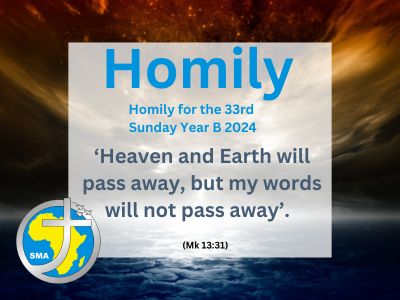Readings: Daniel 12:1-3; Hebrews 10:11-14,18; Mark 13:24-32
Theme: ‘Heaven and Earth will pass away, but my words will not pass away’ (Mk 13:31)
On Sunday, the 14th day of April 1935, a gigantic dust storm hit the American prairie lands, blotting out the sun, killing thousands of people, birds and animals, and causing massive economic and agricultural damage. Woodie Guthrie, the legendary singer-songwriter from Oklahoma, describes that terrible day (known as Black Sunday) in his song, The Great Dust Storm. I quote just a few lines:
‘On the 14th day of April 1935,
There struck the worst of dust storms
that ever filled the sky.
You could see that dust storm comin’,
the cloud looked deathlike black,
And through our mighty nation,
it left a dreadful track….
We thought the world had ended.
We thought it was our doom’
Throughout human history there have been many times when people feared that the world was about to end. Fortunately, their fears proved unfounded. The world is more resilient than many people imagine and has the capacity to bounce back from catastrophic natural and human disasters. In truth, we don’t know for sure if, when or how the world will end. Nevertheless, reading ‘the signs of the times’, it is conceivable that, unless we take radical and concerted action to stall the current rate global warming, we may well bring about the end of the world as we know it, and turn ‘our common home’ into an uninhabitable wasteland.
Today’s Scripture readings echo the sombre mood of our times. Both the first reading and the gospel passage allude to the end of the world. In apocalyptic images they warn us of ‘a time of great distress, unparalleled since nations first came into existence’ (Daniel 12:1); a time when ‘the Sun will be darkened, the moon will lose its brightness, and the stars will fall from the sky’ (Mk 13:24-25). These images are not to be taken literally. They are poetic evocations that echo the all too real images we see on TV almost every day – images of drought stricken lands, burning continents, melting ice caps, flooding cities, and disappearing islands. And they conjure up a frightening scenario of what may lie ahead of us if we do not change our wasteful ways.
However, the message of today’s readings is not one of disaster but rather one of hope. The passage from the Book of Daniel assures us that the Archangel Michael will come to the rescue of ‘all those whose names are written in the Book’ (Dan 12:2), that is, all the faithful of Israel who have persevered in spite of trials and tribulations. It affirms the resurrection of the dead and, in a beautiful image, states that ‘the learned will shine as brightly as the vault of heaven, and those who have instructed many in virtue, as bright as the stars for all eternity’ (Dan 12:3).
Mark’s gospel was written during a time of severe persecution in the early Church. Many members of the community in Rome had been arrested and put to death. Some lost heart and abandoned their faith. In today’s gospel reading, Mark is consoling and strengthening a community threatened with extinction. His message is that those who are faithful need have no fear. ‘They will see the Son of Man [The risen and glorious Christ] coming on the clouds with great power and glory; then he will send the angels to gather his chosen from the four winds, from the ends of he world to the ends of heaven’ (Mk 13:26-27). They must not falter but hold fast to the words of Jesus which, no matter what happens, shall never pass away. For them, the world is not heading towards extinction but towards ‘a new earth and a new heaven’ in which they will share in the glorious reign of their Risen Lord.
This message of hope is as relevant today as ever. We inhabit a world disfigured by appalling injustices, violence and hatred. Confidence in the progress of human civilization has been profoundly shaken by the emergence of seemingly interminable wars and conflicts, including the threat of nuclear war. In the words of Pope Francis, ‘we live in a world lurching from crisis to crisis and lacking a shared roadmap’. In spite of multiple international agreements [yet another one, COP 29, has just begun in Baku, Azerbaijan) to address climate change, the pace of global warming continues to accelerate, threatening the very future of life on earth. A recent EU Report has stated that 2024 is virtually certain to be the hottest in recorded history with warming of 1.5+ degrees C above pre-industrial levels.
And yet, as Christians, we have an unconquerable hope that looks beyond the tragic circumstances of our times. It is a hope based ultimately on the resurrection of Jesus and hence a hope for a new life that rises out of the ashes of death and decay. Such a hope is not confined by the limits of what we can achieve by our own efforts. God’s purpose in creation, reaffirmed in the incarnation, and gloriously manifested in the resurrection of Christ, shall not be defeated. We may not know how or when this completion will happen, but as surely as day follows night it will happen. So, let us say ‘Amen’ to that not just with our lips but with our lives. And let us be witnesses of hope, not prophets of doom, for our troubled world!
Listen to an alternative audio:

